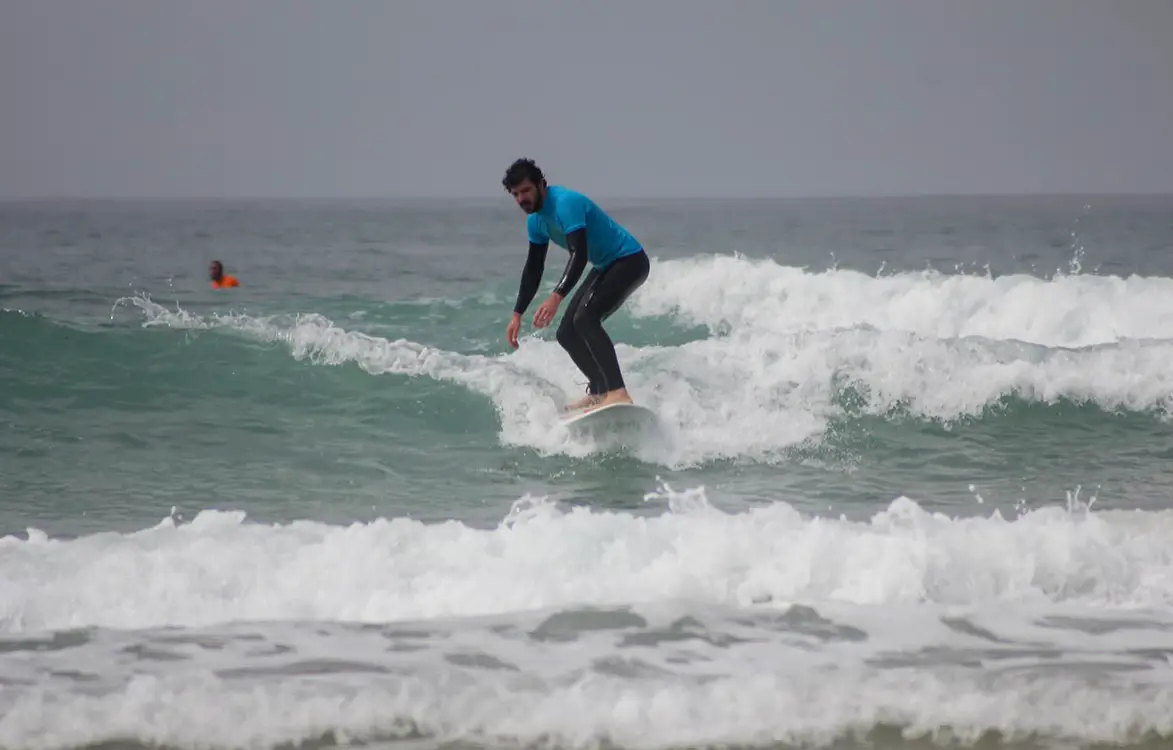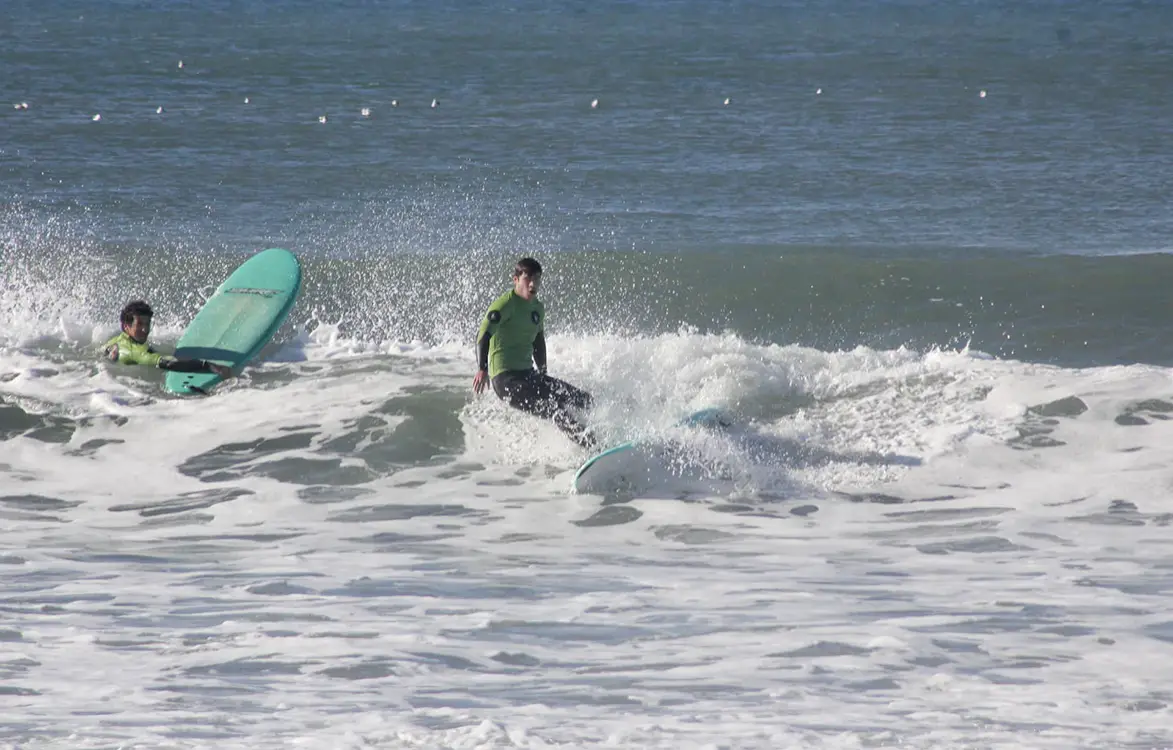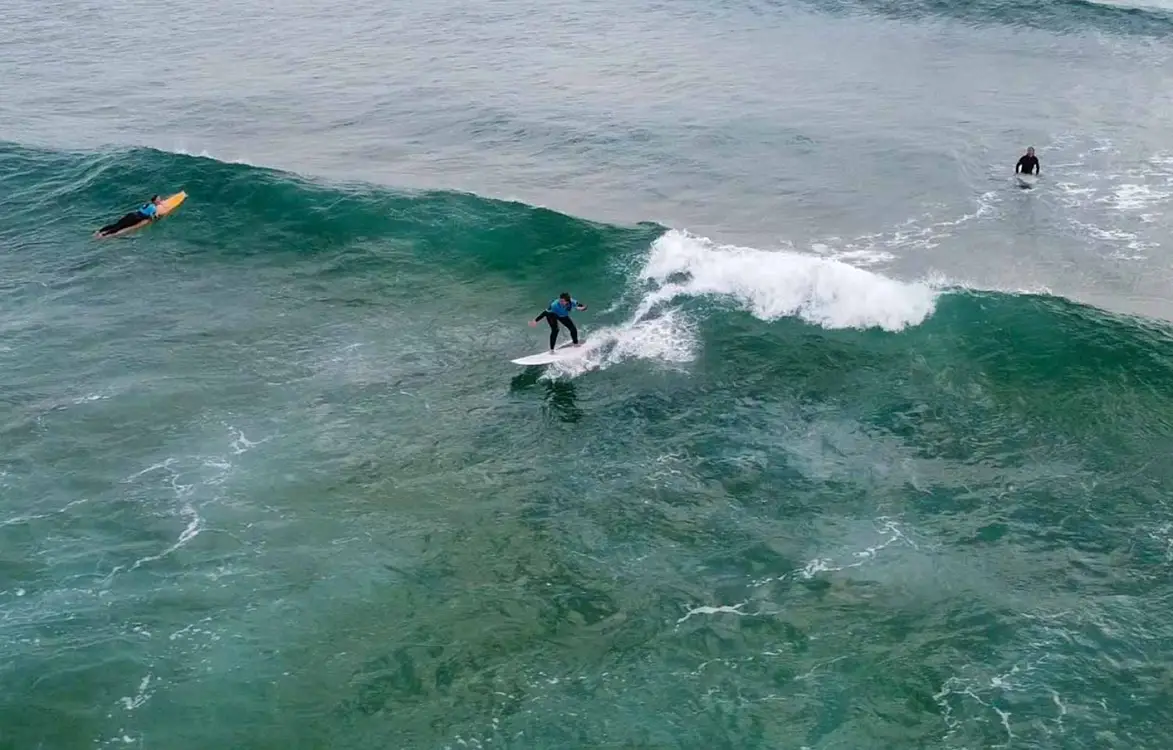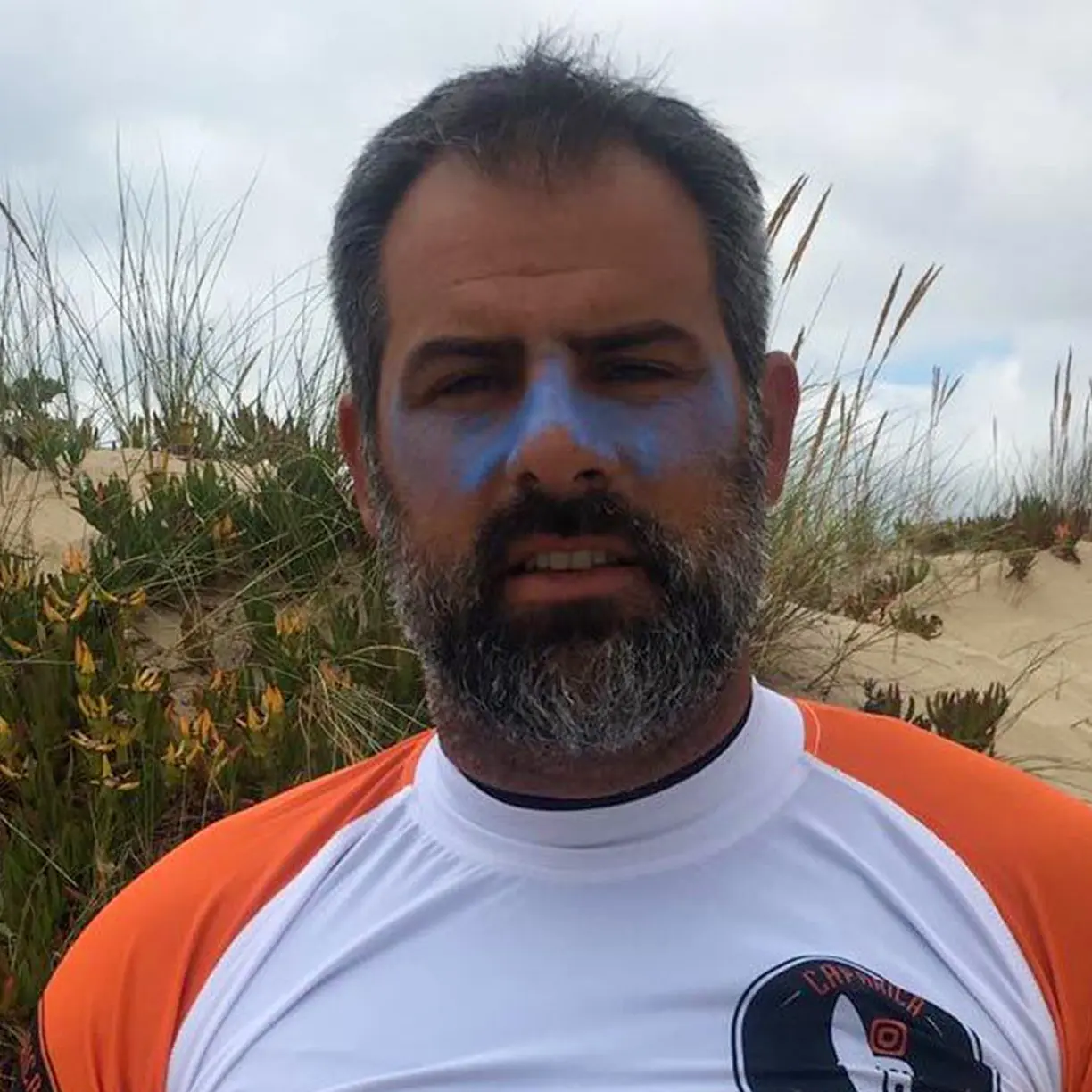Winter surf lessons are surf sessions that occur during the cooler season of the year. During this period, beaches tend to offer larger and more challenging waves, providing a unique opportunity for surfers to hone their skills and face adverse conditions. Due to lesser crowds, winter surf lessons also offer more space and tranquility on the beaches.
There are several benefits to participating in these lessons. First, they help improve surfing technique, as larger waves require greater precision and control. Moreover, surfing in winter challenges surfers to face more difficult weather and sea conditions, contributing to the development of adaptation and overcoming skills. Lastly, winter surf lessons offer less competition, allowing participants to enjoy the ocean with more peace and privacy.
However, it is important to take precautions before participating in winter surf lessons. It’s necessary to choose the appropriate equipment, such as boards with greater volume and sturdy leashes. Besides, it’s indispensable to wear suitable winter clothing, like wetsuits and thermal accessories, to ensure comfort and protection against the cold. It’s also essential to be aware of sea conditions and know one’s physical limits and surfing skills to ensure safety during the lessons.
To make the most out of winter surf lessons, it’s possible to find specialized schools and instructors that offer this type of activity. These institutions have the knowledge and experience to guide participants and ensure a rewarding and safe experience.
In summary, winter surf lessons offer a unique opportunity for surfers to hone their skills, face challenges, and enjoy a tranquil environment. With the right precautions and the support of qualified professionals, it’s possible to fully enjoy this exciting and rewarding experience.
Main Takeaways:
- Improves surfing technique: Winter surf lessons are an opportunity to practice in adverse conditions, helping surfers to hone their skills and become more versatile.
- Challenges adverse conditions: Winter brings larger and more challenging waves, providing an exhilarating and stimulating experience for surfers. This helps them build courage and master new techniques.
- Less competition: In winter surf lessons, competition for waves is lesser, as many surfers prefer to avoid the cold water. This means there’s more space for students to practice and have fun.
What are Winter Surf Lessons?
- Surfing in challenging conditions: Winter surf lessons provide a unique opportunity to learn to surf on larger and more powerful waves, contributing to the development of skills and confidence.
- Special techniques: During winter surf lessons, instructors teach specific techniques to handle colder conditions and larger waves, ensuring a safe and rewarding experience.
- Less crowding: The off-season in winter means less crowded beaches, allowing students to enjoy more space and time on the waves, as well as receive individual attention from instructors.
- Challenge and overcoming: Winter surf lessons offer an opportunity for surfers to face personal challenges and overcome limits, strengthening their mindset and courage.
Pro Tip: Remember to use the appropriate equipment to keep you warm during winter surf lessons, like a good wetsuit and neoprene boots. Don’t forget to do a good warm-up before and after the lessons to prevent injuries and ensure a fun and safe experience!

What are the Benefits of Winter Surf Lessons?
Practicing winter surf brings several benefits for the cold wave adventurers. Discover how to hone your surfing technique, face adverse conditions, and enjoy the tranquility of less crowded beaches. Get ready to dive into this world of challenges and intense emotions as we explore the benefits of winter surf lessons. It’s time to grab the board and surf these cold waters!
Improve Surfing Technique
By practicing winter surf lessons, you can enhance your surfing technique in several different ways:
- Adverse conditions: Surfing during the winter requires going through challenging conditions, such as larger waves and strong winds. This will improve your ability to handle more difficult situations and develop your ability to adapt.
- Less competition: During the winter, many people prefer not to surf due to low temperatures. This means you will have fewer people in the water, which allows the opportunity to catch more waves and practice for longer.
- Focus on technique: With fewer distractions and extra time in the water, you can focus more on your surfing technique. This allows for adjustments and refinements, thus improving your overall performance.
- Overcome personal limits: Winter surfing will require more physical and mental endurance. By overcoming the challenges of cold weather, you will also develop your strength and confidence in and out of the water.
- Learning opportunities: During winter surf lessons, you will have the opportunity to receive guidance and advice from experienced instructors. This can help identify areas for improvement and receive targeted feedback to enhance your technique.
Challenge Adverse Conditions
Challenging adverse conditions in winter surf lessons brings unique benefits.
- 1. Improve surfing technique: Larger and more powerful waves challenge surfers to hone their skills and develop more strength and balance.
- 2. Exciting challenges: Facing adverse conditions creates a sense of overcoming and offers extra adrenaline.
- 3. Less competition: With fewer people on the beaches during winter, it’s possible to enjoy the waves with more peace and space.
Once, a group of fearless surfers faced a winter storm on the icy sea. Despite the harsh conditions, they surfed the giant waves and, in the end, felt an indescribable satisfaction for having challenged their skills and limits.
Less Competition
During winter, surfing lessons offer an advantage: less competition on the beaches. With fewer people in the water, it’s possible to enjoy more time on the waves and have space to practice without worrying about collisions or traffic. Moreover, the absence of a large crowd creates a more calm and relaxing environment, where it is possible to find greater tranquility to focus on the technique and hone your skills. Taking advantage of less competition during winter surf lessons can be a great way to progress faster in the sport.
Pro tip: Enjoy the quiet atmosphere of winter surf lessons to challenge yourself and try new maneuvers and surfing styles.

Preparation for Winter Surf Lessons
Preparing for winter surf lessons implies two essential considerations: choosing the right equipment and wearing appropriate clothes for winter. Discover how to select the perfect board and get to know the garments that will ensure comfort and protection as you face the icy waters. Get ready to make the most of these surfing lessons in the coldest season of the year!
Choosing the Right Equipment
Choosing the right equipment for winter surfing lessons is essential to ensure comfort and safety during practice. Here are some steps to help with this choice:
- Consider the size of the board: Larger boards offer more stability and buoyancy on larger and heavier waves.
- Check the thickness of the neoprene: For colder waters, it’s important to wear thicker neoprene, like 4/3 or 5/4/3, to keep the body warm.
- Choose the right surf boot: Boots with rubber soles and good thermal insulation protect the feet from the cold and possible injuries.
- Use gloves and a hood: In extremely cold temperatures, gloves and a hood are essential to protect hands, head, and ears.
- Don’t forget the sunglasses: Even in winter, UV rays can be harmful to the eyes, so wear sunglasses with UV protection.
Appropriate Winter Clothing
When it comes to winter surf lessons, it’s essential to wear appropriate clothing to keep you warm and protected from the intense cold.
- 1. Neoprene suit: Opt for a neoprene suit with good thickness to isolate the body from the cold water and wind.
- 2. Boots and gloves: Protect your feet and hands from the cold by wearing neoprene boots and gloves to ensure more thermal comfort.
- 3. Hood: Wear a neoprene hood to protect the head and ears from the cold wind and ensure that heat is not lost.
- 4. Additional layers: Consider wearing additional layers of clothing underneath the neoprene to ensure more thermal insulation.
- 5. Sunscreen: Don’t forget to apply a quality sunscreen on exposed areas to protect the skin from UV rays.
Remember that comfort and protection are essential during winter surf lessons. Choosing appropriate winter clothing will help ensure a pleasant and safe experience.
Safety Precautions for Winter Surf Lessons
In winter surf lessons, it’s crucial to prioritize safety. We will address the necessary precautions to make the most of this experience. Let’s understand the sea conditions, to be ready to face the challenges it throws at us. Moreover, we will highlight the importance of knowing our own limits, to practice surfing safely and responsibly. Get ready to discover how to have fun on the icy waves with total safety!
Sea Conditions
The sea conditions are crucial in winter surf lessons. It is important to check the weather forecast and wave conditions before participating in a class. The size of the waves, the strength of the current, and the water temperature are important factors to consider. Larger and stronger waves can be challenging, but they can also provide an opportunity to hone your surfing skills. However, it’s essential to be aware of your own limits and not to risk beyond what you feel comfortable with. Always remember to prioritize your safety in all surfing lessons.
Knowing Personal Limits
- Get familiar with your surfing skills: Before facing larger waves and challenging winter conditions, know well your skills and competencies in surfing.
- Be aware of your physical conditioning: Winter surfing can be more physically demanding. It’s important to be in good shape and prepared to face adverse conditions.
- Consider prior experience: Take into account your experience surfing in winter conditions. If you are just starting, progress gradually and always be aware of your personal limits.
- Observe your fear and respect your limits: Recognize fears that may arise when surfing in challenging conditions and respect your emotional limits. Do not force yourself to face situations in which you do not feel comfortable.
- Seek guidance and help: If you are not sure about your limits and how to progress in winter surfing, do not hesitate to seek guidance from experienced instructors or more seasoned surfers. They can offer valuable advice and help you know your personal limits.
Real story: Once, an inexperienced surfer decided to face large waves on a winter day. He did not know his personal limits and found himself in dangerous situations. After a scary experience, he realized the importance of understanding his limits and seeking knowledge before facing adverse conditions in winter surfing. Since then, he has been dedicated to knowing and respecting his personal limits, enjoying winter surfing in a safe and rewarding way.

Where to Find Winter Surf Lessons
Finding where to catch winter surf lessons can be a complicated task, but there are several options for surfing lovers. Here are some tips to find the best surfing lessons during the colder months:
Local surf schools: Take a look at the surf schools in your area to see if they offer winter lessons. Many of them have specific programs for this season.
Beaches with suitable conditions: Look for beaches known for good surfing conditions during winter. These beaches usually attract instructors and experienced surfers.
Surf groups and communities: Join surf groups or online communities where you can find information about winter surf lessons. Other surfers may share tips and recommendations.
It’s important to remember to check the sea conditions and ensure that there are qualified instructors for a safe experience.
Conclusion
At the end of the winter surf lessons, it’s important to reflect on the benefits and final considerations.
- Skill development: Surfing lessons help improve balance, strength, and coordination.
- Overcoming challenges: Winter surfing can be more challenging due to weather conditions, but it can also bring a sense of accomplishment and overcoming.
- Connecting with nature: The feeling of paddling over the waves in a winter scenery is unique and allows for a deep connection with nature.
- Stimulating body and mind: The practice of surfing combines physical exercise and mental relaxation, promoting a sense of well-being.
Frequently Asked Questions
1. What level of surfing is required to enroll in a surf school for winter surf lessons?
Surf schools generally offer lessons for all levels, from beginner to advanced. If you are starting out, you can enroll in a beginner’s surfing course. If you already have some experience but want to improve, there are courses for intermediate and advanced levels. It’s always a good idea to send an email to the surf school and discuss your surfing level with a coach before enrolling.
2. What type of board is recommended for surfing in winter conditions?
The surfboard you should choose depends on your skill level and the sea conditions. For calmer waters or for beginner surfers, a foam board or longboard may be ideal. For more experienced surfers or for surfing on larger waves, a shorter and more technical board may be more suitable. Consult a surfing instructor at the surf school for personalized recommendations.
3. If I want to improve quickly, what type of lesson pack is more advisable at the surf school?
An intensive pack of surfing lessons might be a good choice if you want to improve quickly. These packs usually include several lessons per week and provide ongoing coaching by an instructor. There might also be packs that include both surfing theory and practice, as well as video analysis to correct and improve your technique.
4. What are the first steps for someone who wants to learn to surf during the winter?
To start, it’s important to find a surf school certified by the Portuguese Surf Federation. You can search for surf schools in places like Carcavelos, Costa da Caparica, or Peniche, which are known for their favorable surfing conditions. After enrolling, make sure you have all the necessary equipment such as a suitable surfboard, a wetsuit, and the willingness to learn and practice despite the cold!
5. What are Winter Surf Lessons?
Winter surf lessons are surfing courses organized during the colder months of the year. These lessons can be an excellent opportunity for you to learn and practice surfing with fewer crowds in the water and, often, more challenging waves. Surf schools, like those situated at Carcavelos beach or Costa da Caparica, often offer surfing lessons all year round, including in the winter, with coaches accredited by the Portuguese Surf Federation.
6. How can I find out which beaches offer the best conditions for surfing in the winter?
The best way is to investigate online, join local surf groups or surfing communities on social media, and ask experienced surfers or local surf schools. Beaches like Peniche, Carcavelos, and Costa da Caparica are known for having good conditions for surfing during the winter in Portugal. You can also check the wave forecasts on specialized websites to get an idea of the conditions before heading to the beach.
